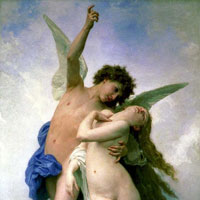
The pasticcio, as a hundred musicologists and publicists will no doubt proclaim before New Year’s Day, has a, time-honored history. Handel, for example (whose work inspired most of the Met’s foray), produced at least three such pieces: Essentially, operas with the music already composed for other operas, the most popular numbers (or the favorites of the available singers) extracted and rearranged around an entirely different classical story, and with other composers’ work utilized as well.
You will ask: How did this differ from Handel’s usual composing style, for (there being no copyright law at the time) he often borrowed from himself and from others to flesh out a new libretto, but a pasticcio made little pretense of being a new drama. It was a pasticcio, too, that drove Handel from the opera stage (at least for a few seasons): the Gay/Pepusch Beggar’s Opera, a sendup of operatic form set among London’s criminal classes to burlesque highfalutin operatic sentiment, which made use of popular tunes instead of operatic airs. W.S. Gilbert did this, too, when Sullivan wasn’t available, writing English verses to well-known opera tunes. Today’s jukebox musicals are pasticceria: old songs hung on a fresh plot. You go out humming.
Amor & Psyche clearly derives from similar impulses. The three singers, all treble and able and skilled at baroque style, could simply have given a recital of their favorite songs and arias from a couple of centuries of music from several different countries—but how dull would that have been? More fun to arrange the thing to a classical myth, as if they were playing out the typical opera composed over one hundred fifty years in four countries and three languages.
Replacing recits with narrative story boards and eliminating ornamented repeats, adding costumes and props and a bit of showoff stage direction, the result is far more entertaining to sit through than the usual concert of baroque vocalism. And at ninety minutes’ duration, it goes down as quickly as the Met’s Orfeo with far fewer dancing distractions.
The story is Apuleius’ fable in which Cupid falls in love with the girl his mother, Venus, has ordered him to destroy; he visits her only in the darkness, but she, growing suspicious and, never having seen Lohengrin, sneaks a lamp into the bedroom. Of course he’s beautiful, but of course he wakes up. She is set three arduous tasks to reclaim him and there’s a happy ending. My favorite version of this story is C.S. Lewis’s Till We Have Faces; second favorite: Lully’s opera, Psyché, given in Boston two years ago. But that required dancing and took over three hours.
The otherwise admirable program, which lists the compositions and their sources (Handel, Dowland, Porpora, Stradella, Krieger …), is maddeningly coy about how Amor & Psyche was put together and who directed whom. My guess is that the three singers, all of them with baroque cred around town in all sorts of presentations, chose all the baroque items they especially liked to sing and pieced them together into something vaguely resembling the predetermined story line. (Early musicals were like this, too. Plot? Who needs a plot?)
The costumes are supremely elegant, the sets minimal, the props winningly silly, and the performers get to mug merrily instead of just standing there being all, like, Early Music formal. (We, the audience, even got to join in on a drinking song led by Pan.) With a cast of three (one of them playing half a dozen roles) and a band of three, the show can travel anywhere, and does: It has been presented far and wide (i.e., Brooklyn and Manhattan), most recently at an Episcopalian church on the Upper West Side last Thursday; its next show is June 5 at the Abingdon Theater in Chelsea Heights.
The performers are Hayden De Witt (Amor), a mezzo with pleasing colors and a forceful delivery; Beth Anne Hatton (Psyche), a soprano with an easy ornamental style, and Alan Dornak (everybody else), a countertenor of a campy, over-the-top manner (think: Nicholas Tamagna, not Alfred Deller), who had to rein in his rambunctious sound so as not to drown out the others. This he did successfully in such duets as “Son nato a sospirar” from Handel’s Giulio Cesare, here a lament for Psyche and her father, only to cut loose and wild in a drinking song by Adam Krieger.
For me, though, the high point of the entertainment was “Dormono l’aure estive,” a superb duet by Francesco Durante, sung by the newlywed Cupid and Psyche, where De Witt’s plangent sighs and Hatton’s brighter tones captured the cuddly eroticism of true love.
Other highlights were Thomas Campion’s “Fire, Fire,” performed by Dornak as an aria of rage for Venus, Francesco Mancini’s “La Farfalletta,” sung by Hatton to a sparkling troupe of origami butterflies, and a memorable opening number cribbed from Antonio Lotti, in which the singers made use of the claims of rival lovers to establish (and exaggerate) their vocal disequilibrium.
It was a sophisticated evening, the musical learning concealed behind a façade of fun. All we needed to complete the illusion was a Roman feast and a cardinal’s salon in which to perform it, probably not during Lent.


